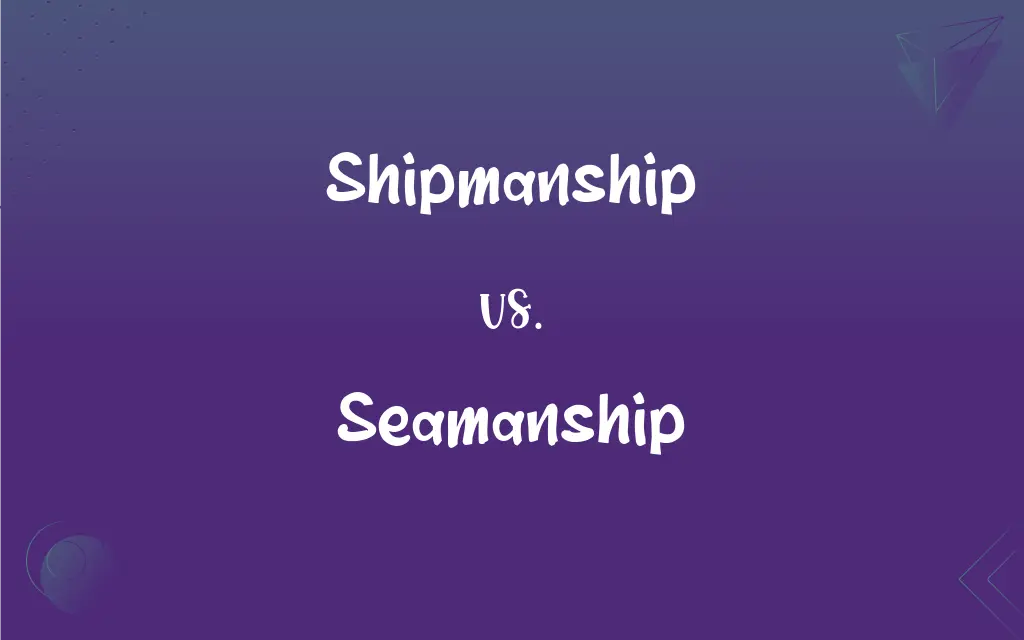Shipmanship vs. Seamanship: What's the Difference?
Edited by Aimie Carlson || By Janet White || Published on January 6, 2024
Shipmanship is a less common term referring to skills in handling a ship, while seamanship is widely recognized as the art of operating a ship or boat proficiently.

Key Differences
Shipmanship, though not a widely recognized term, implies the skill or ability to manage and handle a ship. Seamanship, on the other hand, is a well-established term in nautical contexts, referring to the comprehensive set of skills and knowledge required for operating a ship or boat.
The scope of shipmanship, as inferred from its construction, seems limited to the physical handling of a ship. In contrast, seamanship encompasses a broader range of skills, including navigation, safety procedures, and an understanding of maritime laws and signals.
Shipmanship, due to its less frequent usage, might be interpreted variably but generally points to the practical aspects of managing a ship. Seamanship is a more encompassing term, including the expertise required for managing the crew, maintaining the vessel, and ensuring safe passage.
In terms of linguistic usage, shipmanship is not as established or recognized in nautical circles or general usage as seamanship. Seamanship is a term with historical significance and is widely used in naval and maritime education and training.
Shipmanship could be viewed as a subset of the broader skills encapsulated by seamanship, the latter is the preferred and more comprehensive term in professional and maritime contexts, covering all aspects of competent ship operation.
ADVERTISEMENT
Comparison Chart
Definition Scope
Skills in handling a ship
Broad skills in operating a ship/boat
Usage Frequency
Less common, less defined
Widely recognized and used
Skill Set
Primarily handling and maneuvering
Navigation, safety, crew management
Linguistic Recognition
Limited, not widely established
Historically and professionally significant
Contextual Use
Subset of seamanship skills
Encompasses all aspects of ship operation
ADVERTISEMENT
Shipmanship and Seamanship Definitions
Shipmanship
Skill in the practical handling of a ship.
The captain's shipmanship was crucial during the storm.
Seamanship
The skill and knowledge involved in operating a ship.
Her seamanship was proven in her ability to navigate rough seas.
Shipmanship
The ability to maneuver and control a ship.
His shipmanship was evident in the smooth docking of the vessel.
Seamanship
Proficiency in all aspects of navigation and ship maintenance.
Effective seamanship is essential for a successful voyage.
Shipmanship
Expertise in the operation of shipboard equipment.
Good shipmanship involves understanding all deck machinery.
Seamanship
Expertise in handling maritime emergencies and challenges.
Their seamanship was tested during the unexpected storm.
Shipmanship
Capability in ensuring a ship's seaworthiness.
His shipmanship ensured the vessel was always ready for sea.
Seamanship
Mastery of maritime safety procedures and regulations.
His seamanship included a thorough understanding of safety protocols.
Shipmanship
Proficiency in managing a ship's course.
Accurate shipmanship is key in navigating narrow channels.
Seamanship
Ability to manage a ship's crew and operations efficiently.
The captain's seamanship was reflected in his crew's discipline.
Seamanship
Skill in navigating or managing a boat or ship.
Seamanship
(nautical) Skill in, and knowledge of, the work of navigating, maintaining, and operating a vessel at sea.
Seamanship
The skill of a good seaman; the art, or skill in the art, of working a ship.
Seamanship
Skill in sailing
FAQs
Do you need formal education for shipmanship?
Formal education or training in maritime studies is beneficial.
Is shipmanship only about steering a ship?
No, it also includes navigation, vessel maintenance, and crew management.
What is shipmanship?
Shipmanship refers to the skill and expertise involved in operating and handling a ship.
How does one learn seamanship?
Through maritime courses, hands-on experience, and mentorship.
Is seamanship only for professional sailors?
No, it's a valuable skill for anyone involved in maritime activities.
Is shipmanship important for all types of vessels?
Yes, it's essential for the safe and efficient operation of any vessel.
How does technology impact shipmanship?
Modern technology enhances navigation, safety, and operational efficiency.
Can shipmanship be self-taught?
While basics can be self-taught, formal training is recommended for comprehensive skills.
Is experience important in shipmanship?
Yes, hands-on experience is crucial for developing proficient shipmanship skills.
Does shipmanship involve knowledge of maritime laws?
Understanding maritime laws and regulations is a key aspect of shipmanship.
What are the core skills of seamanship?
Navigation, vessel maintenance, safety procedures, and crew management.
Is there a difference between seamanship for large ships and small boats?
Yes, the techniques and focus areas differ based on the vessel size.
How is shipmanship different from seamanship?
Shipmanship is more focused on handling and operating the ship, while seamanship includes broader maritime skills.
Does seamanship include emergency handling?
Yes, dealing with maritime emergencies is a critical part of seamanship.
Can seamanship be considered a career?
Yes, it's a fundamental skill for various maritime professions.
How important is communication in seamanship?
Effective communication is vital for safety and efficient operations at sea.
Does seamanship involve environmental awareness?
Yes, responsible seamanship includes understanding and minimizing environmental impact.
Is there a certification for shipmanship?
Various maritime certifications exist that validate shipmanship skills.
What is seamanship?
Seamanship is the art of operating a ship or boat, encompassing navigation, maintenance, and crew management.
Are there different levels of seamanship expertise?
Yes, ranging from basic skills for recreational boating to advanced skills for professional mariners.
About Author
Written by
Janet WhiteJanet White has been an esteemed writer and blogger for Difference Wiki. Holding a Master's degree in Science and Medical Journalism from the prestigious Boston University, she has consistently demonstrated her expertise and passion for her field. When she's not immersed in her work, Janet relishes her time exercising, delving into a good book, and cherishing moments with friends and family.
Edited by
Aimie CarlsonAimie Carlson, holding a master's degree in English literature, is a fervent English language enthusiast. She lends her writing talents to Difference Wiki, a prominent website that specializes in comparisons, offering readers insightful analyses that both captivate and inform.






































































